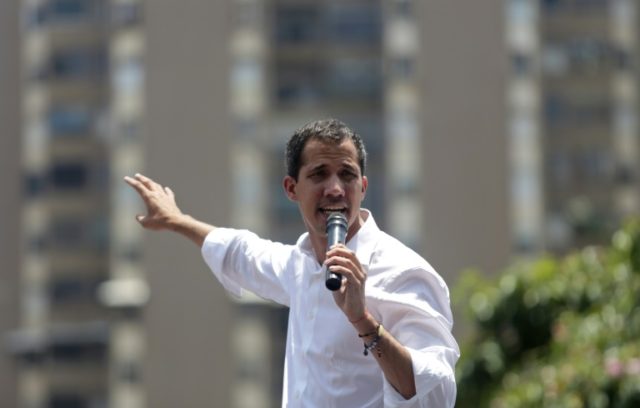Venezuelan President Juan Guaidó’s representative to the Organization of American State (OAS), Gustavo Tarre, told reporters Wednesday that dictator Nicolás Maduro had initially agreed to flee the country, but “changed plans at the last minute.”
Maduro was ready to step down, he added, but hesitated, and now needed more pressure to ultimately flee. Tarre spoke following a dramatic announcement by Guaidó Tuesday that, after nearly four months in office, Venezuela’s armed forces had finally agreed to accept him as their legitimate commander in chief and take power out of Maduro’s hands.
At press time, Maduro remains in power, displaying loyalty from the military in an early morning rally Thursday.
“This Wednesday, during a long lapse [of time], there was a total absence of usurpation and it was because a negotiation was underway to see where Maduro would be going,” Tarre said, according to the Venezuelan newspaper El Nacional. “At the last minute there was a change of plan and Maduro stayed, but what this indicates to us is that he already had a foot out of Venezuela and all he needs is a little push to get the other one [out].”
Tarre dismissed the possibility that Guaidó’s government would enter any new negotiations with the Maduro regime.
“Negotiation is to know when and where he is going, that is what we are open to dialogue about,” he insisted.
The Venezuelan opposition, led for years by several member parties of the Socialist International, has engaged in negotiations with the Maduro regime since Maduro took power in 2013. Each time, Maduro used the time bought by negotiations to solidify his position in power, killing and imprisoning dissidents. The talks have not resumed since 2017.
Tarre’s claim that Maduro had prepared his exit following Guaidó’s call for a complete takeover of the presidential palace Tuesday echoed U.S. Secretary of State Mike Pompeo’s remarks later that day.
“It’s been a long time since anyone has seen Maduro,” Pompeo told CNN. “He had an airplane on the tarmac. He was ready to leave this morning, as we understand it, and the Russians indicated he should stay.”
Pompeo claimed that Maduro was ready to fly to Cuba. The Russian government has since denied the allegation.
Several other key figures in the U.S. government and the Venezuelan opposition have also alleged that not only Maduro, but also senior regime officials, had negotiated the end of the Maduro era with Washington.
National Security Advisor John Bolton said this week that the Trump administration was in contact with three of Maduro’s top henchmen: Defense Minister Vladimir Padrino López, Supreme Court Chief Justice Maikel Moreno, and Iván Rafael Hernández Dala, who leads Maduro’s personal guard. All “agreed that Maduro had to go” and had planned to defect on Tuesday, Bolton claimed, “[but] for reasons that are still not clear, that didn’t go forward.”
U.S. Special Representative for Venezuela Elliott Abrams similarly hinted that the U.S. was in talks with senior Maduro officials, but, he said, “I’ve run across the fact that many of them have turned off their cellphones.” Abrams confirmed the three aforementioned officials, but said that they were among a larger number of potential defectors.
“They talked and talked and talked, and when the time came for action they were not ready to do it,” Abrams said. “Why? What was the role of the Russians, what was the role of the Cubans? We are now trying to find answers to these questions, but we know that there have been a couple of arrests of intelligence leaders and in the military corps.”
Senator Marco Rubio (R-FL) also confirmed these talks, but suggested Wednesday on Twitter that the men have chosen to stick with Maduro.
“Maduro & Cubans know [Maikel Moreno] was plotting against Maduro regime. Strong indications he will try to save himself by issuing an arrest warrant for [Juan Guaidó],” Rubio warned on Twitter.
Maduro lost at least one senior official this week: General Manuel Ricardo Cristopher Figuera, the head of Venezuela’s fear secret police (SEBIN). The SEBIN is in charge of arresting and torturing political dissidents and has its headquarters at El Helicoide, a complex built as a shopping mall that serves as a prison for Maduro’s most vocal foes.
“One cannot live in misery in a country this rich,” Cristopher wrote in a letter published shortly after Guaidó’s uprising. “This generation now in its infancy will grow up with the conditions produced by malnutrition and that damage in irreversible.”
Cristopher also wrote that “one cannot blame the American empire” for what has happened to Venezuela.
Maduro quickly replaced Cristopher with Gustavo González López, a former SEBIN chief deposed for being involved in the suspicious demise of opposition politician Fernando Albán, whose death in their custody the SEBIN ruled a “suicide.”
On Thursday Morning, Maduro appeared on the streets of Caracas flanked by soldiers in a display of alleged unity within the military.
Estamos en marcha permanente por la Patria, con máxima moral para enfrentar las traiciones, desarmar las conspiraciones golpistas y cuidar la Paz de la República. pic.twitter.com/tKIvgRfg76
— Nicolás Maduro (@NicolasMaduro) May 2, 2019
Maduro has branded Guaidó a liar for claiming the military had turned on the socialist leader and vowed a “rectification of the revolution” to remove those who oppose him from society.

COMMENTS
Please let us know if you're having issues with commenting.